七年级下册Unit2复习
七年级下册英语书unit2知识点

七年级下册英语书unit2知识点本文将为大家介绍七年级下册英语书unit2的知识点,包括词汇、语法和阅读,希望对大家提升英语学习有所帮助。
一、词汇1.单词拼写本单元重点单词有:history, card, account, news, photograph等。
学生们需要掌握这些单词的拼写,建议通过多读和复写来记忆。
2.词义辨析学生们需要学会通过上下文理解单词的含义。
在单元2中,学生们需要辨析的单词包括:news和report。
News是指新闻的内容或事实,Report则是一个报道或描述的过程。
3.短语本单元重点短语有:meet up with, take part in, for example, all over the world等。
学生们需要掌握这些短语的用法,并在语言输出中灵活使用。
二、语法1.一般过去时本单元主要介绍了一般过去时。
在单元中,学生们需要注意动词的过去式形式,以及肯定句、否定句和疑问句的结构。
例如:I met my friend yesterday. She didn't take part in the competition. Did you watch the football match last night?2.形容词和副词的比较级本单元还涉及到形容词和副词的比较级。
学生们需要掌握基本的比较级形式,例如:bigger, more interesting等,并学会在句子中使用。
同时,还需要注意一些特殊形式,例如:good—better, well—better等。
三、阅读理解在本单元的阅读材料中,学生将会接触到各种英文文字,例如短语、命令句、对话等。
学生们需要仔细阅读和理解这些材料,支持阅读理解能力的发展。
同时,建议学生们在阅读过程中多动手做练习题,加深对于各类语言形式的认知。
以上为七年级下册英语书unit2的知识点介绍,希望对大家有所帮助。
在学习过程中,建议同学们多进行语言运用和交流,并通过实践锤炼英语能力。
人教版七年级下册英语Unit2知识点梳理及语法讲义(教师版)
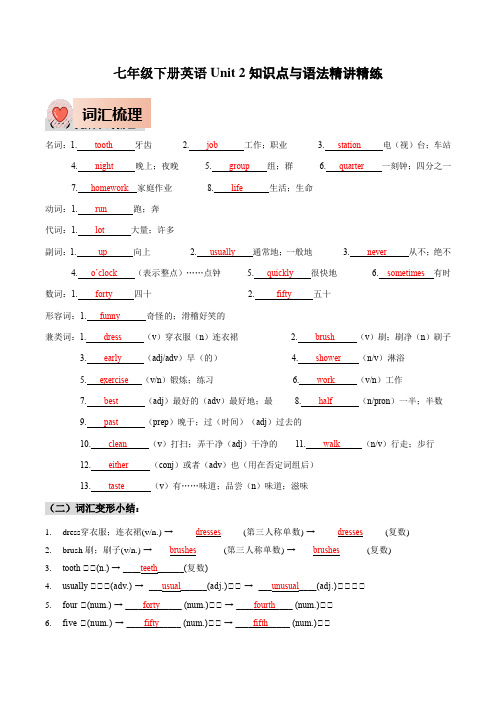
为“What time + do/does +主语+动词原形+其他?”。
Eg. —What time do you get up in the morning? 你早上几点起床?
—At about 6 o’clock. 大约六点钟。
【易混辨析】重点:what time 与 when
单词
用法
例句
图解助记
7. work 牙牙(v/n.) → ____worker____ (n.)牙牙 8. funny 牙牙牙牙牙牙牙牙牙(adj.) → ____fun______ (n.)牙牙 9. best 牙牙牙/牙(adj/adv.) → ___good/well____ (adj/adv.)牙牙/牙 10. half 牙牙牙牙牙(n/pron.) → ___halves_______ (复数) 11. run 牙牙牙(v.) → ____runner______ (n.)跑步者 → ____running_____ (现在分词) 12. clean 牙牙牙牙牙牙(v.) → ____cleaner_____ (n.)清洁工 13. quickly 很快地(adv.) → ____quick______ (adj.)快速的 14. life 生活;生命(n.) → _____lives______ (复数) 【练一练】用所给词的适当形式填空
10. What time does your son usually get ____dressed____ (dress)?
(三)短语攻关:
what time
几点;什么时间
get up
get dressed
穿上衣服
go to school
brush teeth
七年级下册Unit2Whattimedoyouusuallygetup复习要点

Unit 2 What time do you go to school?重点单词,向上,穿衣服连衣裙,刷,牙齿,淋浴淋浴器,通常的,冲动,早,50,工作,电台车站,夜晚,滑稽可笑的,练习锻炼,最好的,一半半数,晚于,家庭作业,群,生活生命,跑,有时,大量的,打扫,行走,很快的,有 ------味道?短语归纳1. what time 几点2. go to school 去上学3. get up 起床4. take a shower 洗淋浴5. brush teeth 刷牙6. get to 到达7. do homework 做家庭作业8. go to work 去上班9. go home 回家10. eat breakfast 吃早饭11. get dressed 穿上衣服12. get home 到家13. either ⋯ or要⋯么⋯要么⋯14. go to bed 上床睡觉15. in the morning/ afternoon/ evening 在上午 / 下午 / 晚上16. take a walk 散步17. lots of=a lot of 许多,大量18. radio station 广播电台19. at night 在晚上20. be late for=arrive late for迟到◆用法1. at +具体时间点在几点(几分)2. eat breakfast/ lunch/dinner吃早饭 /午饭/晚饭3. thirty\half past +基数词⋯⋯点半4. fifteen\a quarter to + 基数词差一刻到⋯⋯点5. take a/an + 名词从事⋯⋯活动6. from⋯ to ⋯从⋯⋯到⋯⋯7. need to do sth需要做某事重点句子1.你通常几点洗澡?我通常6:40 洗澡2. SCOTT有一个有趣的工作. 他在电台工作3.他每天从下午 3 点工作到 6 点4.那真是一个滑稽的早饭时间5.我通常早上六点钟锻炼,6.我上班从来不迟到。
Unit2+单元综合复习2023-2024学年人教版七年级英语下册
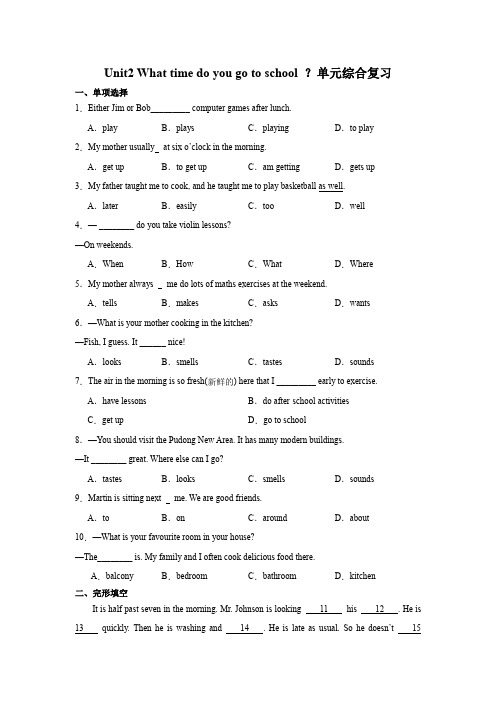
Unit2 What time do you go to school ?单元综合复习一、单项选择1.Either Jim or Bob_________ computer games after lunch.A.play B.plays C.playing D.to play2.My mother usually at six o’clock in the morning.A.get up B.to get up C.am getting D.gets up3.My father taught me to cook, and he taught me to play basketball as well.A.later B.easily C.too D.well4.— ________ do you take violin lessons?—On weekends.A.When B.How C.What D.Where5.My mother always me do lots of maths exercises at the weekend.A.tells B.makes C.asks D.wants6.—What is your mother cooking in the kitchen?—Fish, I guess. It ______ nice!A.looks B.smells C.tastes D.sounds7.The air in the morning is so fresh(新鲜的) here that I _________ early to exercise.A.have lessons B.do after-school activitiesC.get up D.go to school8.—You should visit the Pudong New Area. It has many modern buildings.—It ________ great. Where else can I go?A.tastes B.looks C.smells D.sounds9.Martin is sitting next me. We are good friends.A.to B.on C.around D.about 10.—What is your favourite room in your house?—The________ is. My family and I often cook delicious food there.A.balcony B.bedroom C.bathroom D.kitchen二、完形填空It is half past seven in the morning. Mr. Johnson is looking 11 his 12 . He is 13 quickly. Then he is washing and 14 . He is late as usual. So he doesn’t 15time for breakfast. He is 16 all the way to the station and he arrives there just in time for the train. Mr. Johnson 17 eat anything in the morning. He always 18 a few friends at the office, “It’s nice to have 19 in the morning, but it’s nicer to20 in the bed!”11.A.at B.for C.after D.over 12.A.match B.window C.watch D.book 13.A.getting up B.going to bed C.sleeping D.having breakfast 14.A.dressed B.getting dressed C.dress D.putting on 15.A.has B.has got C.know D.have 16.A.walking B.running C.talking D.dancing 17.A.haven’t B.isn’t C.not D.doesn’t 18.A.says to B.talks C.says D.talks about 19.A.breakfast B.lunch C.tea D.bread20.A.do exercise B.lie C.sleeping D.lying三、阅读理解A阅读短文,根据短文内容,从下面各小题所给的四个备选项中,选出最佳选项。
人教版七年级下册数学Unit 2 知识点总结
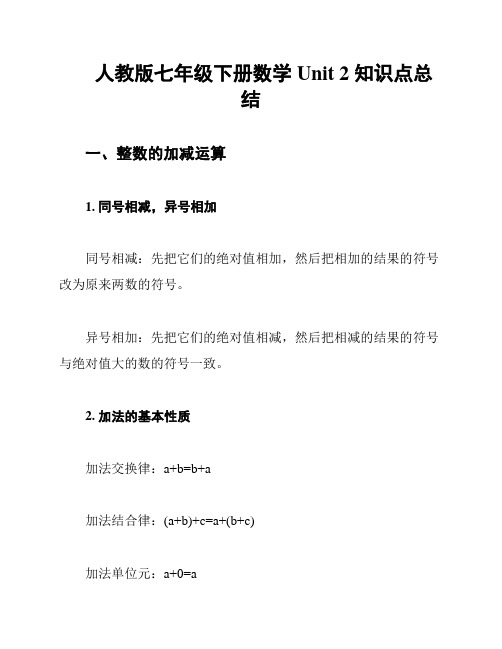
人教版七年级下册数学Unit 2 知识点总结一、整数的加减运算1. 同号相减,异号相加同号相减:先把它们的绝对值相加,然后把相加的结果的符号改为原来两数的符号。
异号相加:先把它们的绝对值相减,然后把相减的结果的符号与绝对值大的数的符号一致。
2. 加法的基本性质加法交换律:a+b=b+a加法结合律:(a+b)+c=a+(b+c)加法单位元:a+0=a3. 减法的基本性质减法的基本性质:a-b=c,a=c+b二、小数的加减运算1. 数轴法小数数轴上每格表示1/10(或0.1)。
小数a对应的点在数轴上,向右移动b个单位就表示a+b,向左移动b个单位就表示a-b。
2. 竖式计算法竖式计算法跟整数加减法竖式计算法类似。
三、正比例函数1. 正比例函数的概念设x,y是两个正比例函数,若对于x的每一个正值,y都与x 成比例,那么就称y是x的正比例函数。
2. 正比例函数的图象y=kx(k>0),是一条通过原点的直线。
k越大,斜率越大,直线越陡。
3. 正比例函数的性质k>0,y=kx 与 x>0,y=k/x 互为反比例函数。
四、图形与运动1. 轨迹物体运动过程中所经过的所有位置构成这个物体的轨迹。
2. 匀速直线运动在相等的时间内,物体在直线上所经过的路程相等,则这个物体做匀速直线运动。
直线上的匀速直线运动可以用速度与位移表示。
3. 路程和位移的关系路程:物体行进的路线长度。
位移:一个物体由一个位置达到另一个位置,它所在直线上起点和终点之间的“直线距离”。
在匀速直线运动中,位移恒等于路程。
4. 速度速度是物体运动在某个方向的变化量,即单位时间内物体行进的长度。
物体速度的计算公式:v= l/t,l是运动物体在某个方向上的行进路程,t是运动物体所用的时间。
5. 等速直线运动当物体在同一直线上行进,且速度大小不变,那么这个物体做的运动就是等速直线运动。
等速直线运动可以用已知路程及物体速度来表示。
6. 图象与运动在坐标系上,把物体的位置与时间对应地表示出来,所得到的图象称为运动图象。
人教版英语七年级下册Unit2【重点短语+词法语法句法精讲】
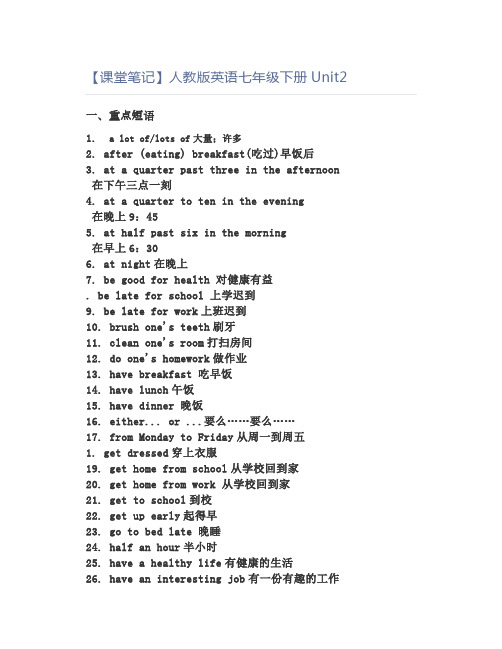
【课堂笔记】人教版英语七年级下册Unit2一、重点短语1. a lot of/lots of大量;许多2. after (eating) breakfast(吃过)早饭后3. at a quarter past three in the afternoon 在下午三点一刻4. at a quarter to ten in the evening在晚上9:455. at half past six in the morning在早上6:306. at night在晚上7. be good for health 对健康有益. be late for school 上学迟到9. be late for work上班迟到10. brush one's teeth刷牙11. clean one's room打扫房间12. do one's homework做作业13. have breakfast 吃早饭14. have lunch午饭15. have dinner 晚饭16. either... or ...要么……要么……17. from Monday to Friday从周一到周五1. get dressed穿上衣服19. get home from school从学校回到家20. get home from work 从学校回到家21. get to school到校22. get up early起得早23. go to bed late 晚睡24. half an hour半小时25. have a healthy life有健康的生活26. have an interesting job有一份有趣的工作27. take a walk散步2. on school nights在上学的晚上29. take a shower洗淋浴30. work at a radio station在电台工二、重点句型1.—What time/When do you usually exercise?你通常什么时候锻炼?—I usually exercise at five o'clock.我通常在5点锻炼。
七年级英语人教版下册Unit2重点知识点归纳
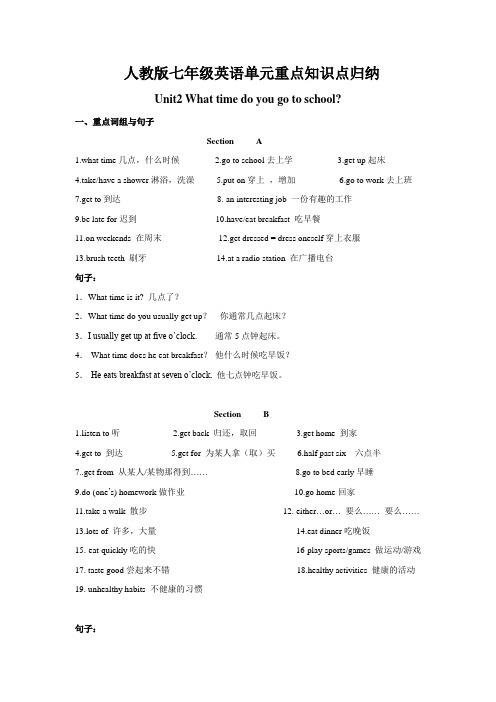
人教版七年级英语单元重点知识点归纳Unit2 What time do you go to school?一、重点词组与句子Section A1.what time几点,什么时候2.go to school去上学3.get up起床4.take/have a shower淋浴,洗澡5.put on穿上,增加6.go to work去上班7.get to到达8. an interesting job 一份有趣的工作9.be late for迟到10.have/eat breakfast 吃早餐11.on weekends 在周末12.get dressed = dress oneself穿上衣服13.brush teeth 刷牙14.at a radio station 在广播电台句子:1.What time is it? 几点了?2.What time do you usually get up?你通常几点起床?3.I usually get up at five o’clock. 通常5点钟起床。
4.-What time does he eat breakfast?他什么时候吃早饭?5.-He eats breakfast at seven o’clock. 他七点钟吃早饭。
Section B1.listen to听2.get back 归还,取回3.get home 到家4.get to 到达5.get for 为某人拿(取)买6.half past six 六点半7..get from 从某人/某物那得到……8.go to bed early早睡9.do (one’s) homework做作业10.go home回家11.take a walk 散步12. either…or…要么……要么……13.lots of 许多,大量14.eat dinner吃晚饭15. eat quickly吃的快16 play sports/games 做运动/游戏17. taste good尝起来不错18.healthy activities 健康的活动19. unhealthy habits 不健康的习惯句子:1.When do students usually eat dinner?学生们通常什么时候吃晚餐?2.I don’t have much time for breakfast.我没有许多时间吃早餐。
人教版七年级下册英语Unit-2单元知识点复习
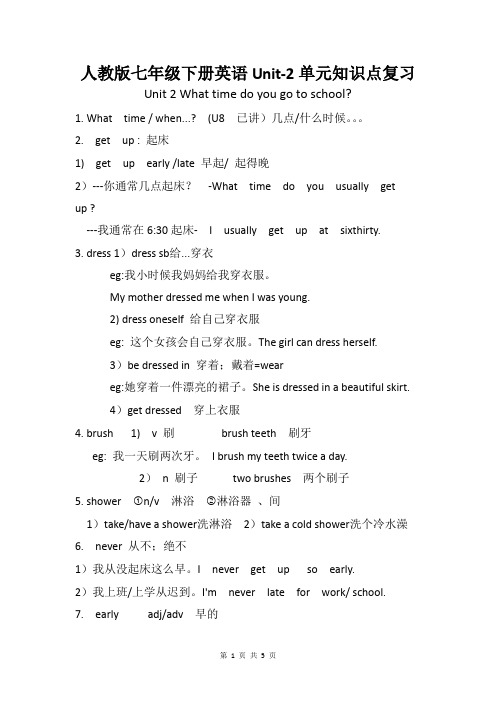
人教版七年级下册英语Unit-2单元知识点复习Unit 2 What time do you go to school?1. What time / when...? (U8 已讲)几点/什么时候。
2. get up : 起床1) get up early /late 早起/ 起得晚2)---你通常几点起床?-What time do you usually getup ?---我通常在6:30起床- I usually get up at sixthirty.3. dress 1)dress sb给...穿衣eg:我小时候我妈妈给我穿衣服。
My mother dressed me when I was young.2) dress oneself 给自己穿衣服eg: 这个女孩会自己穿衣服。
The girl can dress herself.3)be dressed in 穿着;戴着=weareg:她穿着一件漂亮的裙子。
She is dressed in a beautiful skirt.4)get dressed 穿上衣服4. brush 1) v 刷brush teeth 刷牙eg: 我一天刷两次牙。
I brush my teeth twice a day.2)n 刷子two brushes 两个刷子5. shower ①n/v 淋浴②淋浴器、间1)take/have a shower洗淋浴2)take a cold shower洗个冷水澡6. never 从不;绝不1)我从没起床这么早。
I never get up so early.2)我上班/上学从迟到。
I'm never late for work/ school.7. early adj/adv 早的1) catch the early bus赶早班车2) The early bird catch而是the worm.早起的鸟儿有虫吃。
初中英语七年级下册Unit 2知识点复习
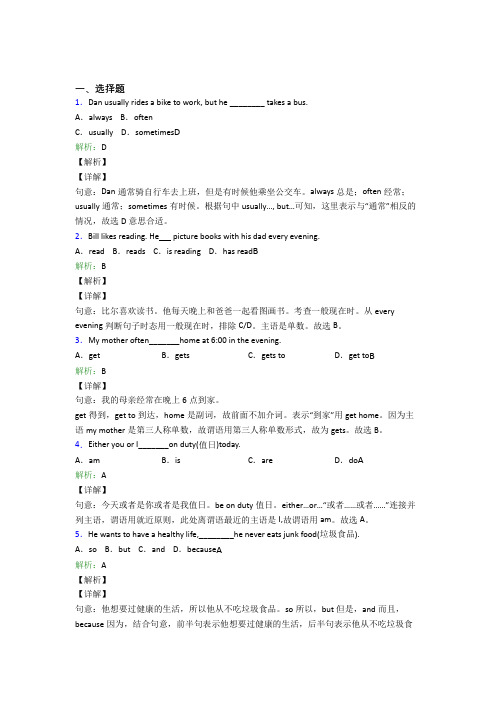
一、选择题1.Dan usually rides a bike to work, but he ________ takes a bus.A.always B.oftenC.usually D.sometimes D解析:D【解析】【详解】句意:Dan通常骑自行车去上班,但是有时候他乘坐公交车。
always总是;often经常;usually通常;sometimes有时候。
根据句中usually…, but…可知,这里表示与“通常”相反的情况,故选D意思合适。
2.Bill likes reading. He picture books with his dad every evening.A.read B.reads C.is reading D.has read B解析:B【解析】【详解】句意:比尔喜欢读书。
他每天晚上和爸爸一起看图画书。
考查一般现在时。
从every evening判断句子时态用一般现在时,排除C/D。
主语是单数。
故选B。
3.My mother often_______home at 6:00 in the evening.A.get B.gets C.gets to D.get to B解析:B【详解】句意:我的母亲经常在晚上6点到家。
get得到,get to到达,home是副词,故前面不加介词。
表示“到家”用get home。
因为主语my mother是第三人称单数,故谓语用第三人称单数形式,故为gets。
故选B。
4.Either you or I_______on duty(值日)today.A.am B.is C.are D.do A解析:A【详解】句意:今天或者是你或者是我值日。
be on duty值日。
either…or…“或者……或者……”连接并列主语,谓语用就近原则,此处离谓语最近的主语是I,故谓语用am。
故选A。
5.He wants to have a healthy life,________he never eats junk food(垃圾食品).A.so B.but C.and D.because A解析:A【解析】【详解】句意:他想要过健康的生活,所以他从不吃垃圾食品。
人教版英语七年级下册 Unit 2 单元巩固与复习 课件(共30张PPT)

forty ['fɔ:(r)ti] num.四十 fifty ['fɪftɪ] num.五十 wow [waʊ] interj.(表示惊奇或敬佩)哇;呀 lot [lɒt], [lɑ:t] pron.大量;许多 funny ['fʌnɪ] adj.奇怪的;滑稽好笑的 run [rʌn] v. 跑;奔 Rick [rɪk] 里克(男名) Jim [dʒɪm] 吉姆(男名) Scott [skɒt], [skɑ:t] 斯科特(男名) Tony ['təʊnɪ] 托尼(男名)
4. 在晚上,我要么看电视,要么玩电脑游戏。 In the evening, I either watch TV or play computer games.
5. 在十二点,她午餐吃很多水果和蔬菜。 At twelve, she eats lots of fruit and vegetables for lunch. 6. 她知道它对她没好处,但是尝起来很好。 She knows it’s not good for her, but it tastes good. 7. 这是你的衣服。 Here are your clothes.
洗淋浴
take a shower
刷牙
brush teeth
吃早饭
eat breakfast
要么…要么…
either…or…
在上午/下午/晚上 in the morning/afternoon/evening
许多,大量
lots of=a lot of
在晚上
at night
洗淋浴
take a shower
2. 那是个有趣的早餐时间。 That’s a funny time for breakfast. 3. 学生们通常什么时候吃完饭? —When do students usually eat dinner? 他们通常在晚上6:45吃晚饭。 —They usually eat dinner at a quarter to seven in the evening.
七年级下册unit2英语知识点总结
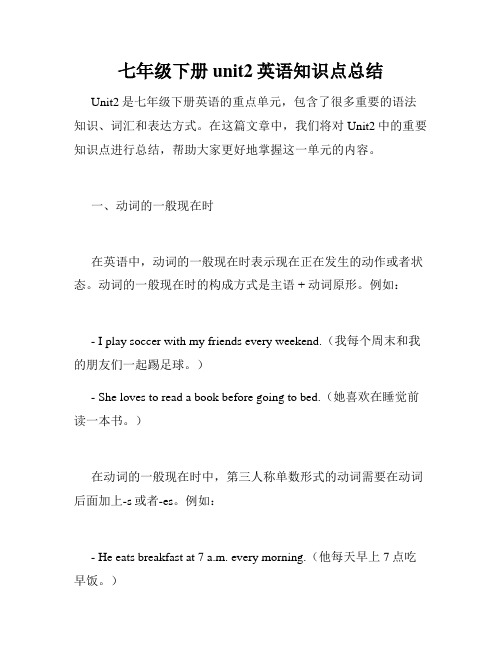
七年级下册unit2英语知识点总结Unit2是七年级下册英语的重点单元,包含了很多重要的语法知识、词汇和表达方式。
在这篇文章中,我们将对Unit2中的重要知识点进行总结,帮助大家更好地掌握这一单元的内容。
一、动词的一般现在时在英语中,动词的一般现在时表示现在正在发生的动作或者状态。
动词的一般现在时的构成方式是主语 + 动词原形。
例如:- I play soccer with my friends every weekend.(我每个周末和我的朋友们一起踢足球。
)- She loves to read a book before going to bed.(她喜欢在睡觉前读一本书。
)在动词的一般现在时中,第三人称单数形式的动词需要在动词后面加上-s或者-es。
例如:- He eats breakfast at 7 a.m. every morning.(他每天早上7点吃早饭。
)- She reads a lot of books every month.(她每个月读很多书。
)二、there be句型there be句型是英语中常用的一种句型,用于描述某个地点存在着某些物品。
句型的构成方式为:there + be动词+ 物品。
例如:- There is a book on the table.(桌子上有一本书。
)- There are some apples in the basket.(篮子里有一些苹果。
)需要注意的是,当there be句型的主语是单数时,使用is;当主语是复数时,使用are。
三、形容词的比较级和最高级形容词的比较级用于比较两个人或物之间的差异,常用的构成方式是在形容词后面加上-er。
例如:- This book is more interesting than that one.(这本书比那本书更有趣。
)- My sister is taller than me.(我的姐姐比我高。
人教英语七年级下册+Unit+2+词汇词组语法重点复习(共15张PPT)
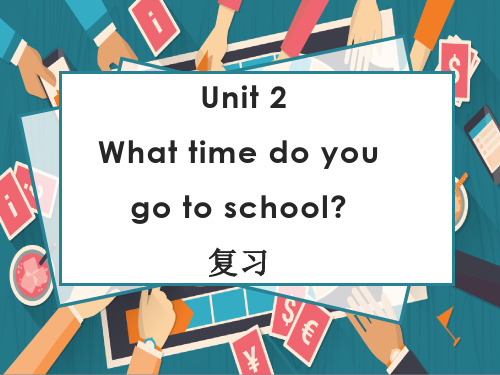
Unit 2 What time do you go to school?
6. What time do you usually get up? 1)这是一个用来询问什么时间做某事的常用句型 句式: What+time+do/does+主语+谓语动词原形+其他?
What time does Lisa go to bed? What time do you usually have lunch? 2)短语what time的意思是“几点”,它和when是同义词,都是对时间进行提问, 但what time所问的时间范围比较小,一般用来提问比较精确的时间,回答的时候 一般具体到几点。而when所问的时间范围比what time要大,回答的时候可以用几 点钟,也可以是上午或者下午,甚至是哪一天、哪一年。 -When is your birthday? -It’s May 10.
Mary, can you help your baby sister get dressed? After I get dressed, I have breakfast.
Unit 2 What time do you go to school?
3. take a shower 1)shower 名词,意为“阵雨,淋浴”;take a shower 意为“洗澡,洗淋浴”, 等于have a shower。shower前面可以加形容词来修饰。
Practice
Ⅳ.句型转换。
1. He gets home at five in the afternoon.(就划线部分提问) _______ _______ _______ he ______ home in the afternoon?
2. Now it’s five thirty.(同义句) Now it’s _______ _______ ________.
人教版七年级英语下册Unit.2 重点词汇及句型归纳总结
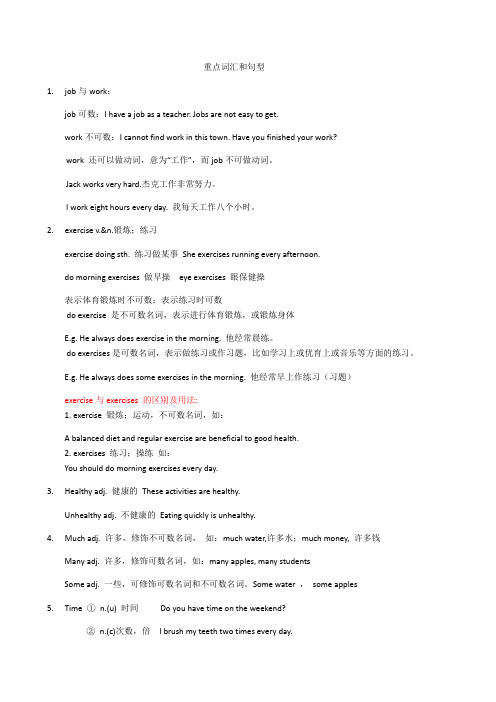
重点词汇和句型1.job与work:job可数:I have a job as a teacher. Jobs are not easy to get.work不可数:I cannot find work in this town. Have you finished your work?work 还可以做动词,意为“工作”,而job不可做动词。
Jack works very hard.杰克工作非常努力。
I work eight hours every day. 我每天工作八个小时。
2.exercise v.&n.锻炼;练习exercise doing sth. 练习做某事She exercises running every afternoon.do morning exercises 做早操eye exercises 眼保健操表示体育锻炼时不可数;表示练习时可数do exercise 是不可数名词,表示进行体育锻炼,或锻炼身体E.g. He always does exercise in the morning. 他经常晨练。
do exercises是可数名词,表示做练习或作习题,比如学习上或优育上或音乐等方面的练习。
E.g. He always does some exercises in the morning. 他经常早上作练习(习题)exercise与exercises 的区别及用法:1. exercise 锻炼;运动,不可数名词,如:A balanced diet and regular exercise are beneficial to good health.2. exercises 练习;操练如:You should do morning exercises every day.3.Healthy adj. 健康的These activities are healthy.Unhealthy adj. 不健康的Eating quickly is unhealthy.4.Much adj. 许多,修饰不可数名词,如:much water,许多水;much money, 许多钱Many adj. 许多,修饰可数名词,如:many apples, many studentsSome adj. 一些,可修饰可数名词和不可数名词。
人教版七年级英语下册Unit 2知识点汇总
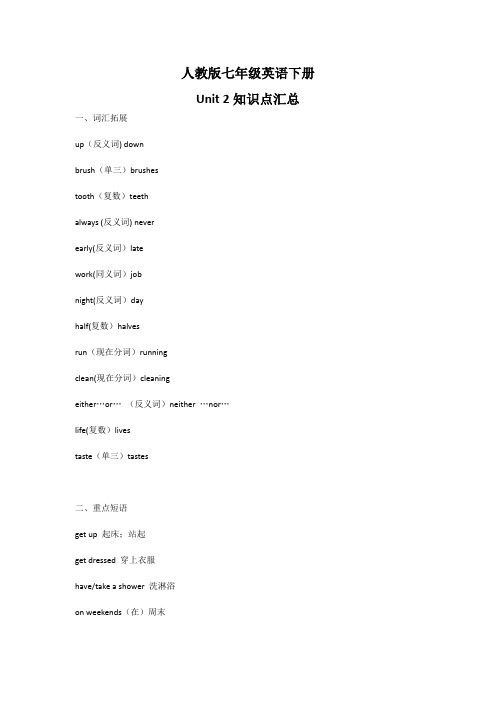
人教版七年级英语下册Unit 2知识点汇总一、词汇拓展up(反义词) downbrush(单三)brushestooth(复数)teethalways (反义词) neverearly(反义词)latework(同义词)jobnight(反义词)dayhalf(复数)halvesrun(现在分词)runningclean(现在分词)cleaningeither…or…(反义词)neither …nor…life(复数)livestaste(单三)tastes二、重点短语get up 起床;站起get dressed 穿上衣服have/take a shower 洗淋浴on weekends(在)周末do (one’s) homework 做作业take a walk 散步;走一走lots of=many+可数(复数)大量,许多either…or... 要么…要么…;或者………或者…brush teeth 刷牙have(eat) breakfast /dinner吃早餐/晚餐go to school 去学校at night 在晚上from…to…从……到……in the morning/ afternoon /evening 在上午/下午/晚上go to work 去上班That's a funny time for…那是做……有意思的时间。
be late for………迟到on school days 在上学期间a quarter past /to+钟点数……过/差一刻钟go to bed 上床睡觉half past +钟点数……点半go home回家eat quickly 吃得快play sports 做运动have much time for …有许多时间做……for half an hour 半小时get home 到家eat a good breakfast 早餐吃得好,好好吃一顿早餐eat …for lunch午餐吃……after lunch /dinner 午餐/晚餐后be (not) good for 对……健康有(没)益taste good 尝起来好吃have a very healthy life 有健康的生活need to do …需要做……from Monday to Friday从周一到周五radio station 广播电台make breakfast for sb. 替某人做早饭get to school 到校三、经典句型1.---What time do you usually get up,Rick?里克,你通常几点起床?---I usually get up at six thirty.我通常六点半起床2.---When does Scott go to work?斯科特什么时候去上班?---He always goes to work at eleven o'clock.他总是在十一点去上班。
人教版七年级英语下册Unit 2 知识点总结+单元测试(word版,含答案)
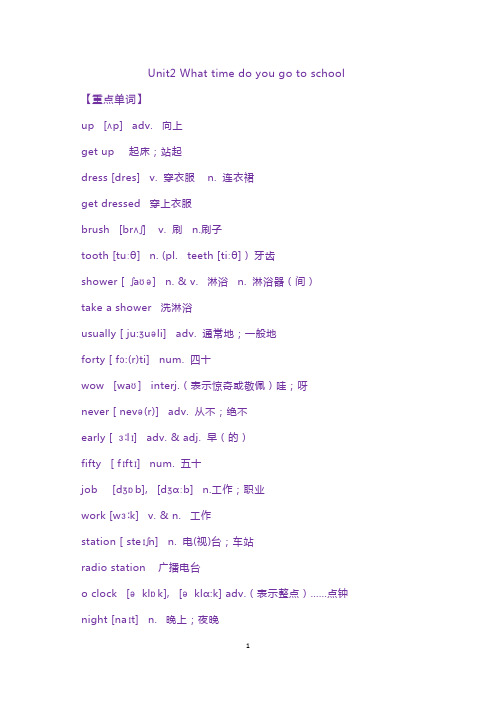
Unit2 What time do you go to school 【重点单词】up [ʌp] adv. 向上get up 起床;站起dress [dres] v. 穿衣服 n. 连衣裙get dressed 穿上衣服brush [brʌʃ] v. 刷 n.刷子tooth [tuːθ] n. (pl. teeth [tiːθ] ) 牙齿shower [ ʃaʊə] n. & v. 淋浴 n. 淋浴器(间)take a shower 洗淋浴usually [ ju:ʒuəli] adv. 通常地;一般地forty [ fɔ:(r)ti] num. 四十wow [waʊ] interj.(表示惊奇或敬佩)哇;呀never [ nevə(r)] adv. 从不;绝不early [ ɜːlɪ] adv. & adj. 早(的)fifty [ fɪftɪ] num. 五十job [dʒɒb], [dʒɑːb] n.工作;职业work [wɜːk] v. & n. 工作station [ steɪʃn] n. 电(视)台;车站radio station 广播电台o clock [əklɒk], [əklɑ:k] adv.(表示整点)……点钟night [naɪt] n. 晚上;夜晚funny [ fʌnɪ] adj. 奇怪的;滑稽好笑的exercise [ eksəsaɪz] v. & n. 锻炼;练习on weekends (在)周末best [best] adj. 最好的 adv. 最好地;最group [gruːp] n. 组;群half [hɑːf], [hæf] n. & pron. 一半;半数past [pɑːst], [pæst] prep. 晚于;过(时间)adj. 过去的quarter [ kwɔː(r)tə(r)] n.一刻钟;四分之一homework [ həʊmwɜː(r)k] n. 家庭作业do (one’s) homework 做作业run [rʌn] v. 跑;奔clean [kliːn] v. 打扫;弄干净 adj. 干净的walk [wɔːk] n. & v. 行走;步行take a walk 散步;走一走quickly [ kwɪkli] adv. 很快地either [ aɪðə(r)], [ iːðə(r) ]adv. 或者;也(用在否定词组后)either…or …要么……要么……;或者……或者……lot [lɒt], [lɑ:t] pron. 大量;许多lots of 大量;许多sometimes [ sʌmtaɪmz] adv. 有时taste [teɪst] v. 有……的味道;品尝 n.味道;滋味life [laɪf] n. 生活;生命【重点短语】1. go to school 去上学2. get up 起床3. get dressed 穿衣服4. brush teeth 刷牙5. eat breakfast 吃早饭6. take a shower 洗澡7. what time 什么时间8. at six forty 在六点四十9. an interesting job 一个有趣的工作10. at the radio station 在广播电视台11. usually /always/ often/ sometimes/ never 经常/总是/经常/有时/从不12. your radio show 你的广播节目13. from …..to 从….到…..14. at night 在夜晚15. a funny time 一个有趣的时间16. take exercise 锻炼17. be late for….. 因…迟到18. at about ten twenty 在大约十点二十19. on weekends 在周末20. on school days 在上学日21. half past six 六点半22. a quarter past three 三点过一刻(3:15)23. a quarter to ten 十点差一刻(9:45)24. do (one’s)homework 做(某人的)家庭作业25. take a walk 散步26. go to bed 睡觉27. eat quickly 吃得快28. have much time 有许多时间29. half an hour 半个小时30. get home 到达家31. either…..or 或者…….或者......32. eat a good breakfast 好好吃顿早餐33. lots of = a lot of 许多34. be good for….. 对…….有益35. taste good 尝起来好36. do her homework 做她的家庭作业37. have a healthy life 有一个健康的生活方式38. have dinner 吃晚饭【重点句型】1. What time do you go to school?你几点去上学?2. 一What time do you usually take a shower,Kick?瑞克,你通常几点钟淋浴?—I usually take a shower at six forty.我通常六点四十淋浴。
初一下册英语第二单元知识点总结归纳

初一下册英语第二单元知识点总结归纳摘要:一、重点句型及回答1.询问喜好和习惯的句型:What do you like to do? / What habits do you have?2.描述他人喜好的句型:He/She likes to do sth./ He/She has the habit of doing sth.3.表达喜好的回答:I like / I don"t like4.表达习惯的回答:I have the habit of doing sth.二、疑问词和回答1.询问时间:What time do you ...?回答:I usually ...at .../ I often ...at ...2.询问地点:Where do you ...?回答:I ...at .../ I ...in ...三、日常用语和场景1.早上问候:Good morning!2.介绍:Hello, this is .../ Nice to meet you.3.感谢:Thank you / You"re welcome4.告别:Goodbye / See you later四、重点词汇1.学科:math / science / English / physical education2.日常活动:play sports / listen to music / read books / watch TV3.食物和饮料:hamburgers / hot dogs / pizza / juice / coffee正文:初一下册英语第二单元主要涵盖了日常交际用语、疑问词询问、表达喜好和习惯的句型以及日常场景对话等内容。
以下是对这些知识点的详细总结:一、重点句型及回答1.询问喜好和习惯的句型:What do you like to do? / What habits do you have?回答:I like playing sports./ I have the habit of reading books.2.描述他人喜好的句型:He/She likes to do sth./ He/She has the habit of doing sth.例如:My brother likes playing video games./ My sister has the habit of waking up early.3.表达喜好的回答:I like / I don"t like例如:I like pizza./ I don"t like coffee.4.表达习惯的回答:I have the habit of doing sth.例如:I have the habit of exercising every day.二、疑问词和回答1.询问时间:What time do you start school?回答:I start school at 7:30./ I usually start school at 7:30.2.询问地点:Where do you live?回答:I live in a apartment./ I live near the supermarket.三、日常用语和场景1.早上问候:Good morning, classmates!2.介绍:Hello, this is my new friend, Lisa./ Nice to meet you, Lisa.3.感谢:Thank you for helping me./ You"re welcome.4.告别:Goodbye, see you later! / See you tomorrow, classmates!四、重点词汇1.学科:math / science / English / physical education例如:My favorite subject is math./ She is good at English.2.日常活动:play sports / listen to music / read books / watch TV例如:I play soccer after school./ She likes to listen to music in her free time.3.食物和饮料:hamburgers / hot dogs / pizza / juice / coffee例如:My favorite food is pizza./ I drink coffee in the morning.通过学习初一下册英语第二单元的知识点,我们可以在日常生活中更好地与他人进行交流,了解彼此的喜好和习惯。
七年级下册人教版英语unit2知识点
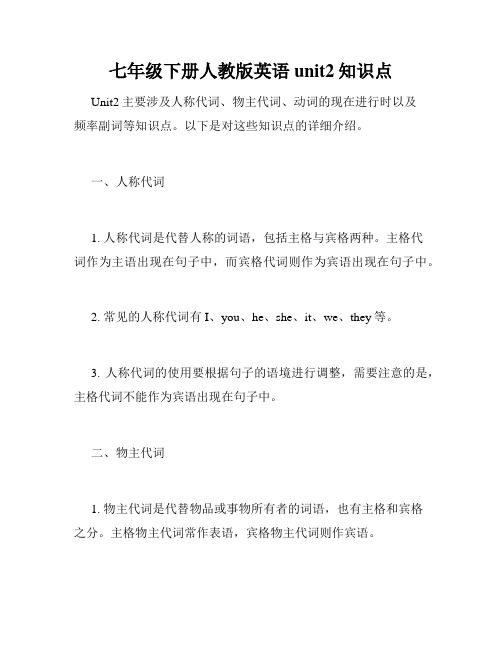
七年级下册人教版英语unit2知识点Unit2主要涉及人称代词、物主代词、动词的现在进行时以及频率副词等知识点。
以下是对这些知识点的详细介绍。
一、人称代词1. 人称代词是代替人称的词语,包括主格与宾格两种。
主格代词作为主语出现在句子中,而宾格代词则作为宾语出现在句子中。
2. 常见的人称代词有I、you、he、she、it、we、they等。
3. 人称代词的使用要根据句子的语境进行调整,需要注意的是,主格代词不能作为宾语出现在句子中。
二、物主代词1. 物主代词是代替物品或事物所有者的词语,也有主格和宾格之分。
主格物主代词常作表语,宾格物主代词则作宾语。
2. 常见的物主代词有my、your、his、her、its、our、their等。
3. 物主代词的使用也要根据句子的语境进行调整,要尽可能在句子中避免重复使用物主代词。
三、动词的现在进行时1. 现在进行时表示现在正在进行的动作,通常由“be + 现在分词”构成。
2. 现在分词的构成:一般情况下,在动词原形的基础上加ing。
但也有一些规则需要注意,如:以不发音的“e”结尾的动词,将“e”去掉再加ing。
以重读闭音节结尾,且末尾只有一个辅音字母的动词,双写末尾字母再加ing。
以“y”结尾的动词,将“y”变成“i”再加ing。
3. 现在进行时要注意的问题:一是不要过度使用现在进行时,二是要注意现在进行时和现在简单时的区别。
四、频率副词1. 频率副词用来描述动作发生的频率,表示有多少次,有多长时间一次或者几率有多大。
2. 常见的频率副词有always、usually、often、sometimes、seldom、hardly ever、never等。
3. 在句中,频率副词通常放在行为动词之前,be动词之后,如:I usually go to school by bike. He is always late for class.总的来说,Unit2涉及的知识点较为基础但重要,要牢记每一个知识点的用法,通过大量的练习来加深对这些知识的理解和掌握。
- 1、下载文档前请自行甄别文档内容的完整性,平台不提供额外的编辑、内容补充、找答案等附加服务。
- 2、"仅部分预览"的文档,不可在线预览部分如存在完整性等问题,可反馈申请退款(可完整预览的文档不适用该条件!)。
- 3、如文档侵犯您的权益,请联系客服反馈,我们会尽快为您处理(人工客服工作时间:9:00-18:30)。
笔试部分
五、完形填空。(15分) Hi,Alan, Thank you for your help last time. Today let me tell you about my school __21__.In the morning I get up __22__ six ten. After that I __23__ my teeth. At about seven o'clock. I eat __24__. Then I go to school. I usually get to school at about seven forty. And I never late __25__ school. At eight o'clock,classes start(开 始).In the morning,we have three __26__.The __27__ class usually ends(结束) at eleven forty. Then it's time __28__ lunch. I have it at school. I usually eat rice __29__ vegetables. I think
4.John usually watches TV on the weekend.
5.I always eat dinner at seven o'clock.
二、听小对话,回答问题。(5分) ( B )6. What time does Dale go to school? A.At 6:00 a.m. B.At 7:00 a.m.
I'm Peter. I'm at the PEP Middle School. I always get up early at six and always brush my teeth at six five. I usually exercise from six fifteen to seven. Then I quickly have a shower and eat breakfast. After that I go to school at eight. I have lunch at a quarter to twelve. I get home from school at half past four and do my homework. I have dinner at seven thirty. After dinner,I usually watch TV for one hour. I go to bed at ten o'clock.
( B )19. Does Peter have lunch at 12:15. A.Yes,he does. B.No,he doesn't. C.I don't know. ( C )20. What doesn't Peter do after dinner? A.Watches TV. B.Goes to bed. C.Plays computer games.
六、阅读理解。(30分) A Ann is a basketball star. She is 18 years old. She usually gets up at six o'clock. She eats breakfast at seven. Ann and her friends usually play basketball from eight to twelve o'clock. At twelve o'clock she has lunch. School starts at two o'clock,she plays basketball again. At six thirty she has dinner. Ann usually does her homework at eight. At nine thirty she watches TV. Ann usually goes to bed at eleven. Basketball is her life!
C.At 8:00 a.m.
W:What time do you go to school,Dale? M:I usually go to school at 7:00.
( C )7. What does Cindy usually do at 7:00 a.m. ? A.Gets up. B.Takes a shower. C.Has breakfast.
M:Do you usually get up at 7:00 in the morning,Cindy? W:No,I usually have breakfast at 7:00.
( B )8. When does the boy play the guitar? A.In the morning. B.In the afternoon. C.In the evening. W:When do you play the guitar? M:I play it in the afternoon.
听下面一段较长对话,回答第13~15三小题。 ( A )13. What does Jack usually do at half past six in the morning? A.Eat breakfast. B.Watch TV. C.Run. ( B )14. Where does Jack have breakfast? A.At school. B.At home. C.We don't know. ( C )15. What does Jack like for breakfast? A.One hamburger and two eggs. B.Some apples and eggs. C.One hamburger and some apples.
they are good __30__ my health. In the afternoon,we have two classes. My classes finish at four o'clock,but after that I have __31__ music lesson for __32__.It is really __33__.I like it very much. Then I __34__. At home,I do my homework __35__.Then I have dinner and watch TV. At about nine o'clock I go to bed. Yours, Su Fei
四、听独白,回答问题。(5分) ( A )16. What time does Peter get up? A.At 6:00. B.At 6:15. C.At 6:30. ( B )17. When does Peter exercise in the morning? A.At 6:10. B.At 6:15. C.At 6:25. ( B )18. What does Peter do after he takes a shower? A.He exercises. B.He eats breakfast. C.He goes to school.
( A)9. What doesn't Mike do after school? A.He doesn't play chess. B.He doesn't watch TV. C.He doesn't do his homework. W:What do you usually do after school,Mike? M:I usually do my homework and watch TV. ( C)10. Who goes to bed at 9:00 pm? A.Jim. B.Tim. C.Tom. W:Do you go to bed at 9:00 o'clock in the evening,Tim? M:No,I go to bed at 9:30,but Tom goes to bed at 9:00.
( B )21. A. month B.day C.show ( A )22. A. at B.on C.in ( A )23. A. brush B.take C.look ( C )24. A. lunch B.dinner C.breakfast ( B )25. A. of B.for C.to ( B )26. A. class B.classes C.classes (C )27. A. fifth B.fourth C.third ( C )28. A. have B.has C.to have ( A )29. A. and B.so C.but ( C )30. A. to B.with C.for ( A)31. A. a B.an C.two ( C)32. A. half hour B.an hour half C.half an hour ( A )33. A. relaxing B.boring C.difficult (A )34. A. go home B.go to home C.go to school ( B )35. A. quick B.first C.early
M:Hi,Jane! W:Hi,Jack!What time do you usually get up? M:At six o'clock. W:Then what do you do in the morning? M:I take a shower. Then I eat my breakfast at half past six. W:Do you have breakfast at home? M:Yes,I do. W:What do you like for breakfast? M:One hamburger and some apples.
